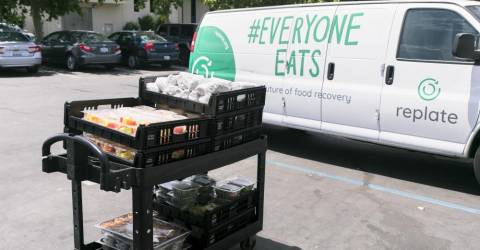
Replate bridges the gap between food waste and food insecurity by addressing both issues simultaneously. This innovative nonprofit uses data and artificial intelligence to collect edible surplus food from businesses, restaurants, caterers, farmers markets and other vendors. Through efficient collection and delivery services, we redistribute food to local community organizations working with food-insecure people.
Since its inception in 2016, the company has collected more than 3.29 million pounds of food and distributed 2.75 million meals to communities. He also helps the environment by saving more than 902 million gallons of water and avoiding nearly 3,377 tons of carbon dioxide that contributes to climate warming.
Replate has national and global reach, working with companies like Door Dash, Chipotle and Netflix. New York City is one of their biggest markets and Replate works with companies and catering companies such as Five Guys, Bento Box, Eko, Dig Feeds, Platterz NYC and Poppy’s Catering.
We connect food to community organizations like Project Rousseau, Covenant House, Bowery Mission and Harlem Grown. We’ve also installed refrigerators in company offices and partnered with start-ups like Fraiche, a company that serves eco-friendly meals made by local chefs, to collect leftovers.
Food waste is a major problem facing New York City. In January 2022, New York passed the Food Donation and Food Scrap Recycling Act. It requires businesses that generate an average of two tonnes of wasted food per week or more per year to donate surplus edible food and recycle food scraps. After a two-year pandemic moratorium on citywide commercial organic requirements, this summer the New York State Department of Health is asking food-related businesses that meet certain requirements to start recycling food scraps and other organic waste. I started demanding.
Replate helps Manhattan businesses recycle surplus food and connect with communities in the process. Our town spoke to Replate’s founder and CEO, Maen Mahfoud, about setting up the company, how Replate’s technology could increase efficiency and help the system work at a larger scale. The interview below has been lightly edited for clarity.
What is the inspiration for Replate?
Growing up in Syria, my mother made many lunches for my brother and I. Before anyone touched the food, she asked us to ride our bikes and distribute some of the food to our community. I brought a meal to a neighbor who has a partner.
Later in life I moved to the United States and was devastated by the level of food insecurity here. I thought of my childhood. Here we have a company that delivers cookies straight to his home within 20 minutes, why can’t we figure this out?
We began moving food from campuses, dining centers and local restaurants and delivering it to shelters, soup kitchens and campsites. Then, combining this with the environmental benefits of food collection, Replate was born.
How can Replate help New York City businesses make their waste management systems more efficient?
Through Replate’s technology-driven platform, partners can track and understand the impact of their donations. Water conservation, CO2 diversion, meals made for the community, analysis of waste patterns, and more. This allows them to make better decisions about their meal orders and move towards source reduction. It also engages with its employees, demonstrating corporate social responsibility and community impact.
The technical side of Replate has played a key role in connecting surplus food to community organizations and tracking impact. How does the company make this process available to people who may be hesitant to navigate new technology?
Replate aims to make donating food as easy as throwing it away. Our technology is easy to use and allows you to schedule food donations with just a few clicks. From there, Replate manages the entire process, storing the data and displaying it colorfully on the client’s dashboard.
Technology has the potential to make a huge positive impact and Replate provides businesses with the right tools to directly reduce food waste. Replate is also one of the most scalable food rescue platforms as the dashboard is data driven and can be implemented in any market. Great for reporting. Whether it’s local governments, major investors, or internal communications, our platform is an important provide a good indicator.
Now that people are opting into the system, could this work on a larger scale? What if, say, there was a law in New York City that required businesses and restaurants to use this system?
Yes, we currently have SB 1383 in California. [The statewide legislation was rolled out in January 2022, which mandates organic waste collection services for residents and businesses.] Businesses must have food collection partners and donate edible food. They are obliged to report their donations to the government. We absolutely assume this will become a national trend.
Another way Replate moves closer to opt-out services is by partnering with catering companies that provide meals to offices and events. Replate thus involves a transaction. Our goal is to reshape the way people think about food donation. It should be as ubiquitous as recycling and an assumed part of the process.
Is there anything you want New Yorkers to know about Replate?
Replate envisions a world that never expires. Food waste, food insecurity and food justice all go hand in hand. About one-third of the food produced each year spoils in consumer and retailer trash bins or due to poor transportation and harvesting practices. We believe this problem is universal and Replate is a great solution.
